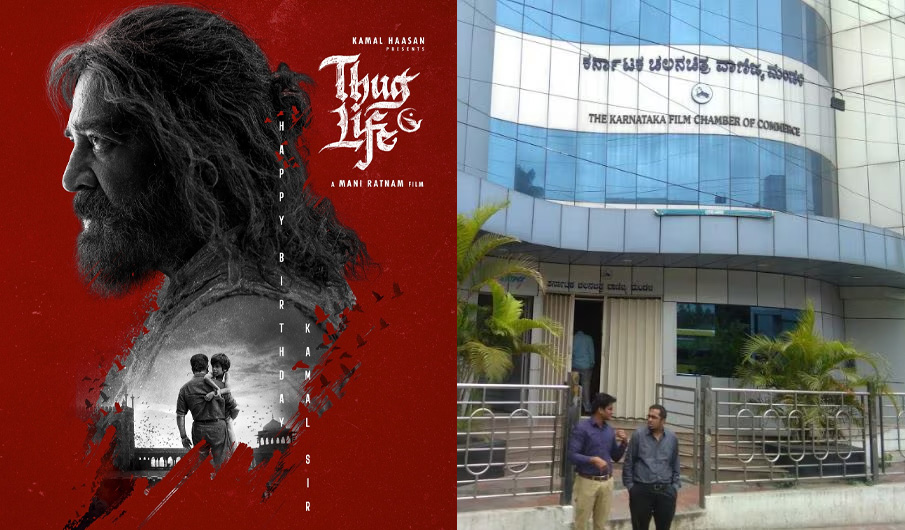KANNADA LANGUAGE ROW: KAMAL HAASAN’S ‘THUG LIFE’ FACES BAN ACROSS KARNATAKA
Karnataka is witnessing a wave of protests and heated debates after the Karnataka Film Chamber of Commerce (KFCC) announced a ban on the release of Kamal Haasan’s much-anticipated film ‘Thug Life’ across the state. The decision, which has sparked widespread attention and divided opinions, stems from a controversial remark made by Haasan during the film’s audio launch in Chennai, where he stated, “Kannada is born out of Tamil.” This comment has triggered a strong backlash from pro-Kannada groups, political leaders, and cultural organisations, leading to a major controversy that has now become a trending topic in Karnataka and across India.
The controversy surrounding ‘Thug Life’ has also sparked a broader conversation about the role of cinema in shaping cultural narratives and regional identities. Kannada cinema, often referred to as Sandalwood, has a rich history of promoting local culture, language, and values. The backlash against Kamal Haasan’s remarks underscores how deeply intertwined language and cinema are in Karnataka, where films are not just entertainment but a vital expression of identity and pride. Many industry insiders believe that this incident will lead to a renewed focus on protecting and promoting Kannada culture through film.
The incident has also highlighted the challenges faced by pan-Indian actors and filmmakers who work across multiple linguistic markets. While India’s diversity is celebrated, it also means that statements or portrayals that might be acceptable in one region can cause offense in another. Kamal Haasan’s experience with ‘Thug Life’ serves as a cautionary tale for artists who must navigate the sensitivities of different linguistic and cultural audiences while maintaining creative freedom and authenticity.
Social media has played a significant role in amplifying the controversy, with hashtags related to the ‘Thug Life’ ban trending across platforms like Twitter and Facebook. Supporters of Kannada pride have used these platforms to mobilize protests, share historical facts about the Kannada language, and call for boycotts of the film. Conversely, some fans of Kamal Haasan have defended his right to free speech and artistic expression, leading to heated online debates. This digital dimension has intensified the issue, making it a national conversation beyond Karnataka’s borders.


CONTROVERSIAL REMARK: HOW A SINGLE STATEMENT SET OFF A FIRESTORM
The controversy began on May 24, 2025, at the audio launch of ‘Thug Life’ in Chennai. Kamal Haasan, addressing the audience, claimed that the Kannada language originated from Tamil. This statement was perceived as an affront to Kannada linguistic and cultural identity, resulting in immediate outrage. Pro-Kannada activists tore down film banners and staged protests near cinema halls, especially in Belagavi district. The Karnataka Rakshana Vedike, a prominent pro-Kannada organisation, filed a formal complaint against Haasan, alleging that his statement had hurt the sentiments of Kannadigas and demanding a public apology.
The economic impact of the ban on ‘Thug Life’ in Karnataka is also a point of concern for distributors and cinema owners. Karnataka is a significant market for South Indian films, and a ban on a high-profile release like ‘Thug Life’ could affect box office revenues and ancillary businesses such as advertising and merchandising. Industry analysts suggest that prolonged controversies could deter producers and actors from engaging with the Kannada market, potentially limiting the diversity of films available to local audiences.
Cultural organisations in Karnataka have called for greater collaboration between filmmakers and linguistic communities to prevent such conflicts in the future. Proposals include setting up advisory panels comprising historians, linguists, and cultural experts who can review scripts and public statements related to language and culture. Such measures aim to foster mutual respect and understanding, ensuring that films contribute positively to India’s pluralistic society rather than becoming flashpoints for division.
KFCC AND POLITICAL RESPONSE: BAN DEMANDS AND DEADLINES
In response to mounting pressure, the Karnataka Film Chamber of Commerce convened an urgent meeting with industry stakeholders and pro-Kannada groups. KFCC representatives, including Sa Ra Govindu and President M Narasimhalu, declared that ‘Thug Life’ would not be allowed to release in Karnataka unless Kamal Haasan issued a public apology for his remarks. The film chamber set a 24-hour deadline for the actor to apologise, warning that failure to do so would result in a complete ban of the film in the state. Several Kannada organisations, including the Karnataka Rakshana Vedike, stood united in their demand for an apology, with protests intensifying across the region.
Karnataka’s Minister for Kannada and Culture, Shivaraj Tangadagi, echoed these sentiments, stating that a ban would become “inevitable” if Haasan did not apologise. Congress MLA Ravikumar Gowda also urged the chamber to take swift action, warning that the government would intervene if the film chamber failed to act. The political consensus across party lines reflected the depth of feeling on the issue and the importance of linguistic pride in Karnataka.


KAMAL HAASAN’S RESPONSE: DEFIANCE AND CLARIFICATION
Kamal Haasan, known for his outspoken nature, responded to the controversy by standing his ground. Speaking to the media, he stated, “I’ve been threatened before. If I’m wrong, I’ll apologise. If I’m not, I won’t. This is my lifestyle, please don’t tamper with it.” Later, while interacting with the press in Thiruvananthapuram, Haasan clarified that his statement was made “out of love” and cited historians as the source of his language comments. He further argued that in-depth discussions about language origins should be left to experts, not politicians or public figures, and reiterated that he did not intend to hurt anyone’s sentiments.
Despite his clarification, Haasan has not issued a formal apology, and the KFCC has remained firm in its stance. The chamber, along with several Kannada organisations, has vowed not to allow the release of ‘Thug Life’ in Karnataka unless a public apology is made. This defiance by Haasan has only added fuel to the fire, with protests and calls for a ban continuing unabated.
CULTURAL IMPACT: LANGUAGE, IDENTITY, AND CINEMA IN THE SPOTLIGHT
The ‘Thug Life’ controversy has reignited debates about language, identity, and cultural pride in Karnataka. For many Kannadigas, Haasan’s remark was seen as an attempt to undermine the rich and independent history of the Kannada language, which has deep literary and cultural roots. Cultural leaders and former KFCC presidents, such as Jayamala, have emphasised the need for unity among Kannadigas and called for responsible public discourse, urging Haasan to acknowledge the hurt caused and apologise for his statement.
The controversy has also drawn comparisons with previous incidents, such as the ban on Haasan’s film ‘Vishwaroopam’ in Tamil Nadu, highlighting the recurring tension between creative expression and regional sensitivities. The current standoff has brought together Kannada organisations, political leaders, and the film industry in a rare show of solidarity to defend linguistic pride and demand accountability from public figures.
PROTESTS AND PUBLIC SENTIMENT: KANNADA GROUPS MOBILISE ACROSS THE STATE
Protests against ‘Thug Life’ have spread to several districts in Karnataka, with activists staging demonstrations, tearing down posters, and calling for a boycott of Kamal Haasan’s films. The Karnataka Rakshana Vedike and other groups have organised rallies and submitted memoranda to government officials, demanding strict action against the actor and a complete ban on his films until he apologises. The intensity of the protests reflects the deep emotional connection Kannadigas have with their language and the widespread perception that their identity has been slighted.


LOOKING AHEAD: UNCERTAINTY OVER ‘THUG LIFE’ RELEASE AND BROADER IMPLICATIONS
As of now, the release of ‘Thug Life’ in Karnataka remains uncertain. The film, slated for a grand release on June 5, is set to open in other states and overseas markets, but its fate in Karnataka hinges on whether Kamal Haasan chooses to apologise. The controversy has set a precedent for how language-related disputes can impact the film industry, with industry observers warning that such incidents could have long-term implications for cross-cultural collaborations and the freedom of artistic expression in India.
The situation has also prompted calls for greater sensitivity and responsibility from celebrities and public figures when commenting on matters of language and culture. As the debate continues, the ‘Thug Life’ row serves as a reminder of the enduring power of language to unite—and divide—communities, and the need for dialogue and mutual respect in a diverse country like India.
Finally, the ‘Thug Life’ controversy has reignited discussions about the importance of education and awareness regarding India’s linguistic diversity. Many experts argue that promoting knowledge about the origins, evolution, and contributions of various Indian languages can build empathy and reduce misunderstandings. Initiatives in schools, media, and public forums that celebrate linguistic heritage could help bridge divides and encourage respectful dialogue, turning controversies like this into opportunities for unity rather than conflict.
The ‘Thug Life’ controversy in Karnataka also raises questions about the role of film censorship and self-regulation in India’s entertainment industry. While some argue that the KFCC’s ban is a legitimate response to protect cultural sentiments, others see it as a form of censorship that infringes on artistic freedom. The debate underscores the ongoing tension between the need to respect cultural sensitivities and the right to creative expression, a balance that remains a complex and evolving challenge for filmmakers and regulators alike.
Follow: IMDb Thug Life
Also Read: 5 Transformative Shifts: Wipro’s CTO Leadership Ushers in a New Era of Innovation and Growth

